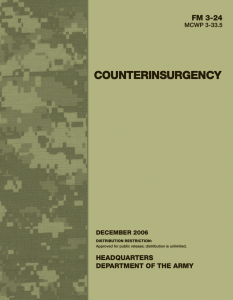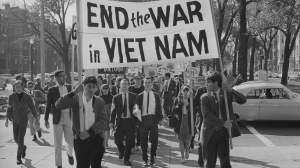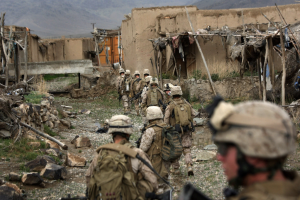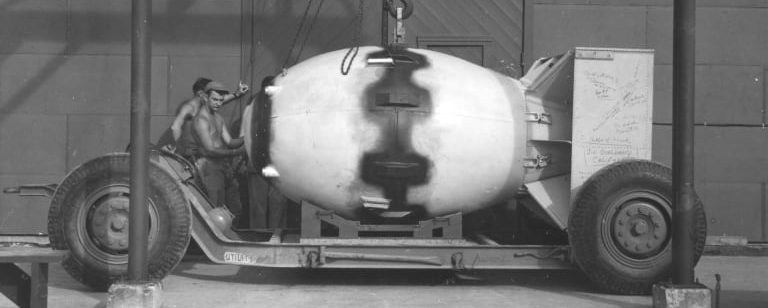
U.S. Army Field Manual (FM) 3-24/Marine Corps Warfighting Publication 3-33.5, Counterinsurgency
Currently, insurgencies pose a serious threat to international security. These smaller, traditionally weaker, non-state actors have been able to stay afloat amid conflicts against larger, traditionally stronger, state actors such as the United States. This is due to the fluidity of their tactics and strategy which evolves depending on the demands of the conflict. Insurgent operations are conducted upon reflection of past successes and failures. Whereas, US military operations have been orchestrated more concretely by conventional war/warfare strategies regardless of previous failures. Insurgencies have been capitalizing on the stagnant military strategy of the US by using fourth-generation-warfare tactics. 4GW is an invasive and irregular style of war that has no perceptible limitations, penetrating all aspects of life where the battle is waged. There isn’t a clear battlefield, enemy, or even a conclusion to 4GW. The protracted nature of 4GW makes it costly especially if the counter strategy employed isn’t compatible. Contemporary US military strategy, which hinges on third-generation-warfare tactics, is incompatible with 4G war. 3GW is a trademark of the US; involving, head-to-head battles focused on defeating the adversary through the means of force. It’s necessary for US military strategy to be influenced by history given 4GW is the only type of war the US has lost; and done so three times: in Vietnam, Lebanon, and Somalia (Hammes 2004, 3). The conflicts in Iraq and Afghanistan demonstrate that 4G wars aren’t things of the past. Instead, 4GW is the framework of conflicts in the future. Although there are critics of the investment of strengthening counterinsurgency in the US military, the US faces COIN operations more often than full-scale war (Nagl 2009, 24). Given the US’s present-day military endeavors, the Department of Defense must further legitimize COIN training and apply COIN strategies in future combat to counter the proliferation of insurgencies and promote world-wide stability.
General William Westmoreland, Colonel Harry Summers, and Gian Gentile, believed the failure of Vietnam was a result of inadequate force and lack of conventional operations, not the insurgent opposition (Nagl 2009, 20-21). In fact, Colonel Summers perceived the insurgency as “inconsequential” to the result of the conflict (Nagl 2009, 21). Using “tanks and mechanized infantry” to the US’s “maximum advantage,” as Colonel Summers and Gentile suggested, would’ve had minimal utility in Vietnam. This is because the insurgents had studied the US military’s approach and knew it would be susceptible to defeat given their 4GW tactics (Nagl 2009, 25). In doing so, the insurgency exploited the holes in US operations (Nagl 2005, 25).
As Secretary Robert Gates said, “our enemies and potential adversaries have gone to school on us” (Nagl 2009, 25). Examinations of past US military successes have prompted insurgencies to steer away from conventional fighting (Nagl 2009, 25). Insurgency’s meager capabilities to fight conventionally don’t match those of large-state-superpowers that are well funded and equipped. Instead, insurgents use unconventional methods to compete with these larger state actors (Nagl 2009, 25). Some methods insurgents use to keep their adversaries on their heels are: information gathering, implementing guerilla tactics, and executing acts of terrorism (Nagl 2009, 25). The US military isn’t adept at combating these threats, which gives insurgents an opportunity for success.

College students marching in Boston demonstrating the waning domestic support for the war effort
The conventional style war the US exercised in Vietnam, was costly. The insurgent’s steady erosion of US successes and troops made for a prolonged war. This caused the will of the military and domestic support of the war to wane (Hammes 2004, 67). The extensive expenditures of the war, money, resources, soldiers, and time, sparked opposition among American citizens. Domestically, there was no “visible payoff” of US intervention in Vietnam because the victories were temporary and scant (Mack 1975, 185). Therefore, American citizens questioned the rationale of intervening in Vietnam and criticized the war effort as the costs were clearly outweighing the benefits.
The change the US military must make to put an end to being outsmarted by smaller and conventionally weaker insurgent forces is to further legitimize COIN operations and promote the strategic utilities it provides. Although the lessons from Vietnam have been available since 1975, the US Army did not include COIN strategy in standard operating procedures until 2006 with the development of the US Army Field Manual (FM) 3-24/Marine Corps Warfighting Publication 3-33.5, Counterinsurgency (Nagl 2009, 23). Yet, even with the FM incorporating COIN, the army had still failed to institutionalize COIN strategies in the five years of conflict in Iraq and seven years of fighting in Afghanistan (Nagl 2009, 23). The lack of universal acceptance and application of COIN, will perpetuate US strategic defeat in 4G wars.
It’s necessary for the US to make systematic change for the preservation of its reputation. COIN operations prioritize securing the civilian population to promote the safety of non-combatants (Nagl 2009, 23). The US’s early ad hoc approaches to COIN in Iraq and Afghanistan left civilians defenseless against insurgent attacks and victimized by the excessive use of force (Nagl 2009, 23). Furthermore, in Iraq in 2006, the Army failed to increase the number of troops on the ground to provide sufficient security for the civilian population (Nagl 2009, 23). Similarly, in Afghanistan, forces are chronically undermanned causing troops to rely on airstrikes as a way to fight the adversary (Nagl 2009, 23). These airstrikes further endanger civilians (Nagl 2009, 23). The unwillingness to adhere to a COIN strategy in Iraq and Afghanistan imply American complacency of civilian casualties. Thus, deteriorating the US’s reputation.

US Marines patrolling – Now Zad Afghanistan
Hopefully, the US Army will acknowledge the significance of implementing COIN strategy in Afghanistan. The Taliban and its allies want to retake control of Afghanistan. To do so, the Taliban must force the US and its allies to retract (Nagl 2009, 24). The US must incorporate COIN strategies and 4GW tactics into their military operations in Afghanistan. The implications of the US continuing to use outdated, conventional, 3GW strategies go beyond the extensive expenditures and lack of domestic support for the war effort. US defeat in Afghanistan could mean the Taliban retake Afghanistan, threatening the stability of neighboring Pakistan, a nuclearized state and with closeted al-Qaeda sympathizers. All of which would contribute to further regional instability
The repercussions of the US failing to update its military strategy will cause more problems to international security.
